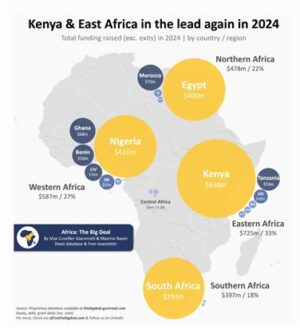By Ebenezer Chike Adjei NJOKU
Passage of the long-awaited Start-up and Innovation bill could mark a turning point for the country’s nascent technology sector, according to Richard Nunekpeku – Vice President-Legal and Strategy at the Ghana Fintech and Payments Association – who says it will be crucial as the new administration seeks to position Ghana as a competitive destination for global venture capital.
The bill, which remains in draft form, takes on renewed significance as Ghana’s start-up ecosystem struggles to attract international investment. Recent data show Ghana secured just US$68million of start-up funding in 2024, placing it sixth among African nations and significantly behind regional technology hubs.
“Passing the Ghana Start-up bill into law could accelerate Ghana’s tech start-up ecosystem. Therefore, the new Ministry of Communication, Digital Technology and Innovation must own the process, finalise the draft and drive its passage,” Mr. Nunekpeku said in an interview with B&FT.
The legislation, which has been in development since January 2020, aims to provide a structured framework for supporting innovation in the domestic technology sector.
In 2024, funding received by Ghanaian start-ups was approximately 10.66 percent of what their Kenyan counterparts received (US$638million) and 16.59 percent of Nigeria’s US$410million. The two other countries in the ‘big four’ – Egypt and South Africa – received US$400million and US$394million respectively.
Mr. Nunekpeku believes that Kenya – having raised approximately 29 percent of the estimated total US$2.2billion for start-ups on the continent – is reaping the rewards of its reputation as ‘Africa’s Silicon Valley’, which has been attained by deliberate efforts to deepen its regulatory framework and widen the diversity of its offerings.
“The results began to show in 2024 when it attracted more start-up funding than Nigeria, This growing dominance can be attributed to the maturing state of its fintech and clean energy ecosystems, accrued benefits from implementing its dedicated Start-up Act and the diversity of its innovation ecosystem spanning health tech, agritech and clean-tech,” he explained.

Comparatively, he added, Ghana does not have the advantages that Kenya has, with the local fintech ecosystem still developing predominantly around payments – coupled with an innovation ecosystem that has not yet attained diversity.
Quite worryingly, the 2024 figure was similar to the previous year’s and a far cry from the US$111million, US$167million and US$202million raised in 2020, 2021 and 2022.
Mr. Nunekpeku, who is also a private legal practitioner, believes the ecosystem is bearing the brunt of investor confidence-loss due to a number of notable scandals – particularly the collapse of Dash in 2023 after raising over US$85million.
Founded in 2019 by Prince Boakye Boampong, the platform promised to solve the biggest headache of many businesses and individuals by seamlessly connecting mobile money wallets and bank accounts across the continent.
However, it emerged that the company had falsified growth numbers. Additionally, it was spending approximately US$500,000 monthly – mostly in overhead costs, with its CEO paying himself US$50,000 monthly – according to a report by TechCabal.
“Regaining investor confidence, mainly since Dash’s collapse was due to financial misconduct, will take some time. It will require verifiable implementation of good corporate governance practices and the building of strong compliance cultures and systems, among others, by start-ups looking to raise funding in Ghana,” he stressed.
The FinTech Association VP stated that ensuring a more robust governance framework is non-negotiable in reversing the trend.
To address other limitations, he advocated a broader approach to technology development.
“We need to prioritise the diversification of our start-up ecosystem. Over the years, we have focused significant attention on developing the fintech ecosystem… which has produced some great results. But now, we must broaden the scope to support inclusive innovations in agriculture, health, insurance, education, mobility & logistics and services,” Mr. Nunekpeku said.
Restructuring the Ministry of Communication to include digital technology and innovation signals potential progress. This expanded mandate could facilitate the implementation of more comprehensive technology policies across various sectors.
Beyond the Start-up bill, he stressed the need for robust regulatory frameworks that balance innovation with consumer protection. “Government policy initiatives must seek to de-risk innovations and protect end-users through regulations that advance consumer protection and privacy, eliminate biases & discrimination and prevent fraud, cyber-attacks and identity theft, among others,” Mr. Nunekpeku stated.
Furthermore, he called for the state to focus on building tech skill sets for young people through formal and informal education, establishing and equipping tech hubs across the country to prevent over-concentration of skill development opportunities in the cities.
“We must look at driving investment into ICT infrastructure and public-private sector partnerships to unlock funding, capacity building and investments,” he added.










